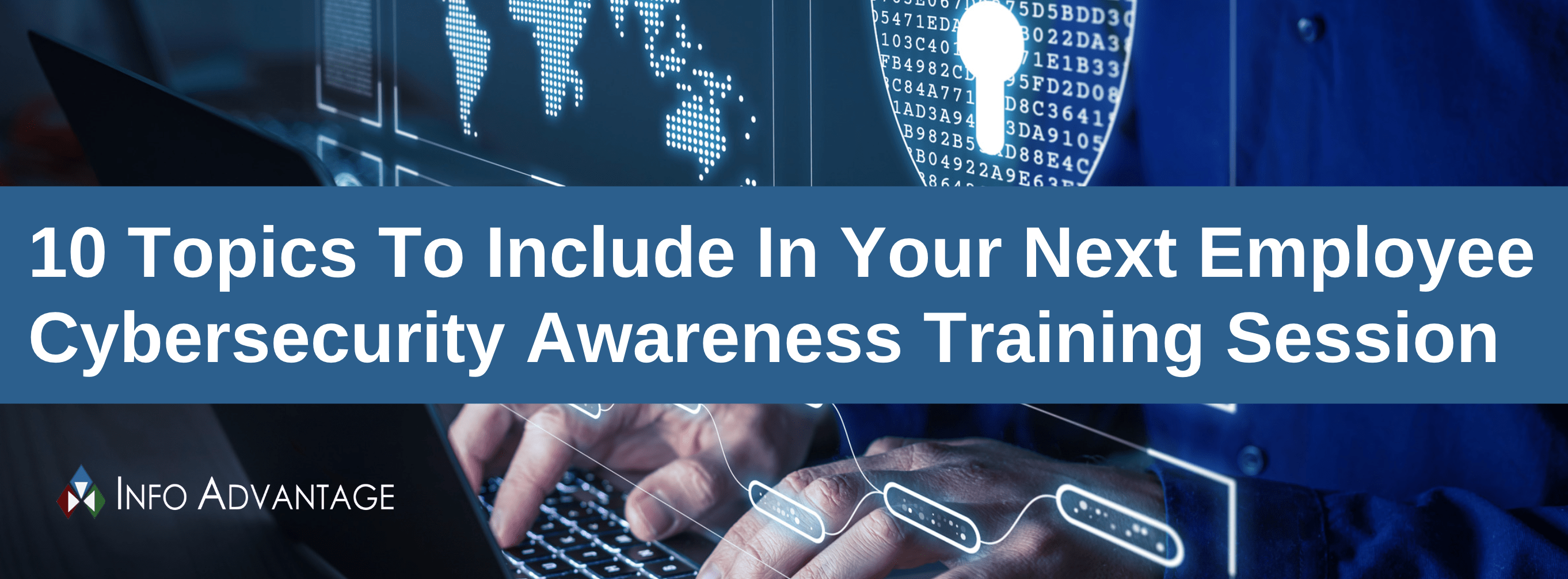Info Advantage Blog
10 Topics To Include In Your Next Employee Cybersecurity Awareness Training Session

Battling cyberthreats is an ongoing challenge for businesses of all sizes. As technology continues to evolve, so must the ways in which organizations protect their networks, systems, and data. To that end, employee cybersecurity awareness training is critical to ensuring that employees stay ahead of cyberthreats and use best practices to protect company data.
When planning the next employee cybersecurity awareness training session for your New York business, make sure to include these 10 key topics:
1. Password best practices
Weak passwords are one of the top causes of data breaches, so it's essential that employees understand how to create strong passwords and why enabling two-factor or multifactor authentication is vital. Underscore the importance of never reusing passwords or writing them down where they can be easily accessed by someone else. Instead, encourage the use of a password manager for securely generating and storing strong passwords.
2. Identifying email phishing schemes
Despite the prevalence of phishing scams, many people are still unaware of the various tactics cybercriminals use to try and gain access to company networks. Educate your staff on how to spot phishing emails and inform them of the risks associated with clicking on links and opening attachments from unknown or suspicious senders.
3. Understanding social engineering
Social engineering is the manipulation of people into providing confidential information or access to networks, systems, and data. In your cybersecurity awareness training program, discuss the different types of social engineering attacks, such as pretexting, tailgating, and //medium.com/@Mailfence/social-engineering-what-is-baiting-747255c55a52" style="text-decoration: none;">baiting, then offer advice on how to avoid falling for these scams.
4. Patch management
Cybercriminals often exploit unpatched software vulnerabilities to gain access to systems. Train employees on the importance of downloading and installing updates as soon as they become available, and ensure they are aware that patching all operating systems, software applications, and hardware is essential for security.
5. Mobile device security
Cybercriminals are increasingly targeting mobile devices, as they often contain sensitive company data. Inform employees of the steps they can take to secure their mobile devices, such as using antivirus software and locking their devices with strong passwords or biometrics.
6. Safe browsing
Encourage employees to visit only trusted websites and avoid downloading unnecessary software or clicking suspicious links. Remind them not to send sensitive information over public Wi-Fi networks, where it could be easily intercepted by an attacker.
7. Social media security
Social media accounts can be linked to employees' corporate networks, so it's crucial that they understand the risks of using their social media accounts in a professional capacity. Advise them not to share confidential company information and recommend the use of privacy settings as a way to limit who can view their posts.
8. Physical security
Cybersecurity is not limited to the digital world, and the physical security of systems and data should also be discussed in employee training sessions. Make sure employees are aware of their surroundings when accessing company networks, understand secure document disposal, and know how to identify and report suspicious activity.
9. Business continuity and disaster recovery
Cyberattacks can cause major damage to an organization, so employees need to know what steps should be taken in the event of a data breach. Explain your company's business continuity plan and how it ties into disaster recovery, emphasizing the importance of minimizing downtime in order to reduce the risk of further damage.
10. Regulatory compliance
Businesses must adhere to certain regulations when it comes to protecting sensitive data. For instance, organizations that handle credit card payments must comply with the Payment Card Industry Data Security Standard. Educate employees on the various regulations that apply to your organization and their roles in maintaining compliance.
By covering these 10 essential topics in your next employee cybersecurity awareness training session, you can ensure your employees have the knowledge and skills they need to stay resilient against cyberthreats.
Info Advantage can help you develop an effective employee cybersecurity awareness training program that will keep your organization secure and compliant. Get in touch with us today to learn more about our services.
Comments
Tag Cloud
Mobile? Grab this Article




